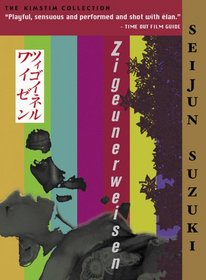| Actors: Yoshio Harada, Naoko Otani, Toshiya Fujita, Michiyo Ookusu, Kisako Makishi Director: Seijun Suzuki Creators: Kazue Nagatsuka, Nobutake Kamiya, Genjiro Arato, Hyakken Uchida, Yôzô Tanaka Genres: Indie & Art House, Drama, Horror, Mystery & Suspense, Military & War Sub-Genres: Indie & Art House, Drama, Horror, Mystery & Suspense, Military & War Studio: Kimstim Format: DVD - Color,Widescreen - Subtitled DVD Release Date: 03/07/2006 Original Release Date: 01/01/1980 Theatrical Release Date: 01/01/1980 Release Year: 2006 Run Time: 2hr 24min Screens: Color,Widescreen Number of Discs: 1 SwapaDVD Credits: 1 Total Copies: 0 Members Wishing: 2 MPAA Rating: Unrated Languages: Japanese Subtitles: English |
Search - Zigeunerweisen on DVD
  | Zigeunerweisen Actors: Yoshio Harada, Naoko Otani, Toshiya Fujita, Michiyo Ookusu, Kisako Makishi Director: Seijun Suzuki Genres: Indie & Art House, Drama, Horror, Mystery & Suspense, Military & War UR 2006 2hr 24min |
Larger Image |
Movie Details
We're sorry, our database doesn't have DVD description information for this item. Click here to check Amazon's database -- you can return to this page by closing the new browser tab/window if you want to obtain the DVD from SwapaDVD.
Click here to submit a DVD description for approval.
Similar Movies
|
Movie ReviewsNeurotic erotica LGwriter | Astoria, N.Y. United States | 10/05/2007 (4 out of 5 stars) "True to form, Seijun Suzuki here delivers an over-the-top cinematic tour-de-force, set in Japan circa the 1930s, contrasting an intensely studious Japanese professor of German language and literature with an equally intense former classmate--who seems to have no real profession--in their desire for and manner of relating to the same two women, as well as a third, who may or may not be one of the other two. If this sounds confusing, welcome to the world of Seijun Suzuki!
As is the case with many, if not most Suzuki films, it's pretty tough to provide a linear plot summary. Suzuki is the master of hyperbolically elliptical cinema (how's that for a metaphoric description?) which he fuses with a B-movie sensibility that ultimately produces something truly unique. The professor's friend--a shaggy-haired guy who sometimes wears an eye patch, sometimes not--is possibly a serial killer, but that doesn't seem to be a critical plot point. But one thing he definitely is, and that's basically nuts. Wacko. Intense. At the beginning of the film, the two men find the same geisha, O-ine. Both express their desire for her in their respective ways, and she finds favor with both. Ultimately, both men marry different women, but the nutcase guy marries a woman who looks exactly like O-ine--but it's not her. Through the first two-thirds or so of the film, there's a really nutty Greek chorus supplied by three blind beggars--a young man, a young woman, and an old man. Upon first encounter, they all sing a crude song of lust, and then are seen arguing among themselves--mostly the two men fighting over the girl--as they make their way randomly through the world. At one point, Mr. Nutjob accompanies them; he's not the kind to stay tied down for any length of time and is drawn to their bizarre little scenario. Later, the nutcase is seen almost naked sitting in the snow. As I said, you can't really describe a Suzuki film in any linear way, because it's not a linear film. Mr. Nutjob also deeply enjoys his friend's (the professor's) wife, and there is as well a strong pull from the nutcase's wife on the professor. Nutjob has previously impregnated his wife who ultimately dies, and it's O-ine, the geisha, who finally comes to the Nutjob's house to take care of the baby. I won't reveal what happens closer to the end of the film because this is where even more wacky stuff happens. This film was honored soon after its release with the Japanese equivalent of several Oscars and it's easy to see why. Suzuki was doing what nobody else in Japanese cinema did--or for that matter, what almost nobody else in world cinema did or even is doing today. This is a fascinating piece of work, whose title comes from a piece of music for violin written and played by Pablo Sarasate, which is heard at the beginning of and in various spots throughout the movie. Really interesting and well worth seeing--if not owning." |



